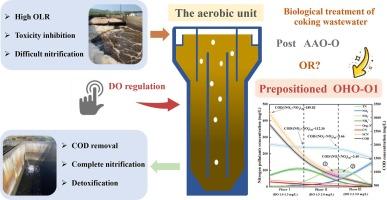全规模好氧-水解和反硝化-好氧工艺中的再好氧处理和溶解氧调节,以实现焦化废水的同步解毒和硝化。
IF 9.7
1区 环境科学与生态学
Q1 AGRICULTURAL ENGINEERING
引用次数: 0
摘要
焦化废水的生物处理是一项挑战。预置好氧工艺的应用鲜有系统报道,其中预置好氧单元(O1)的解毒和硝化性能值得研究。结果表明,O1 通过调节溶解氧实现了稳定的同步解毒和硝化,有效地维持了氨化、亚硝化和完全硝化阶段。微生物群落结构、代谢途径和功能基因在不同阶段表现出不同的偏好。高溶解氧浓度(2.20-3.00 mg/L)有利于与碳氮相关的主要代谢途径和功能基因的富集。BOD5/CODCr 比率、溶解氧和有毒污染物共同塑造了微生物群落结构和氮转化过程。基于溶解氧调控原理,它可以通过微生物快速增殖的污染物解毒机制,从复杂废水中建立一个脱氮生物转化区,为有毒工业废水的处理提供了一种可行的方法。本文章由计算机程序翻译,如有差异,请以英文原文为准。

re-aerobic treatment and dissolved oxygen regulation in full-scale aerobic-hydrolysis and denitrification-aerobic process for achieving simultaneous detoxification and nitrification of coking wastewater
The biological treatment of coking wastewater is a challenge. The application of prepositioned aerobic process has rarely been systematically reported, among which the detoxification and nitrification performance of the prepositioned aerobic unit (O1) is worthy of investigation. Results indicate that O1 achieves stable simultaneous detoxification and nitrification by regulating the dissolved oxygen, effectively maintaining ammonification, nitrosation, and complete nitrification phases. Microbial community structure, metabolic pathways and functional genes showed different preferences at different phases. High dissolved oxygen concentrations (2.20–3.00 mg/L) benefited the enrichment of carbon and nitrogen related major metabolic pathways and functional genes. BOD5/CODCr ratio, dissolved oxygen and toxic pollutants together shaped microbial community structure and nitrogen transformation processes. Based on the principle of DO regulation, it could assemble a biotransformation compartment for nitrogen removal from complex wastewaters through a pollutant detoxification mechanism of rapid microbial proliferation,and provides a promising approach for toxic industrial wastewater.
求助全文
通过发布文献求助,成功后即可免费获取论文全文。
去求助
来源期刊

Bioresource Technology
工程技术-能源与燃料
CiteScore
20.80
自引率
19.30%
发文量
2013
审稿时长
12 days
期刊介绍:
Bioresource Technology publishes original articles, review articles, case studies, and short communications covering the fundamentals, applications, and management of bioresource technology. The journal seeks to advance and disseminate knowledge across various areas related to biomass, biological waste treatment, bioenergy, biotransformations, bioresource systems analysis, and associated conversion or production technologies.
Topics include:
• Biofuels: liquid and gaseous biofuels production, modeling and economics
• Bioprocesses and bioproducts: biocatalysis and fermentations
• Biomass and feedstocks utilization: bioconversion of agro-industrial residues
• Environmental protection: biological waste treatment
• Thermochemical conversion of biomass: combustion, pyrolysis, gasification, catalysis.
 求助内容:
求助内容: 应助结果提醒方式:
应助结果提醒方式:


